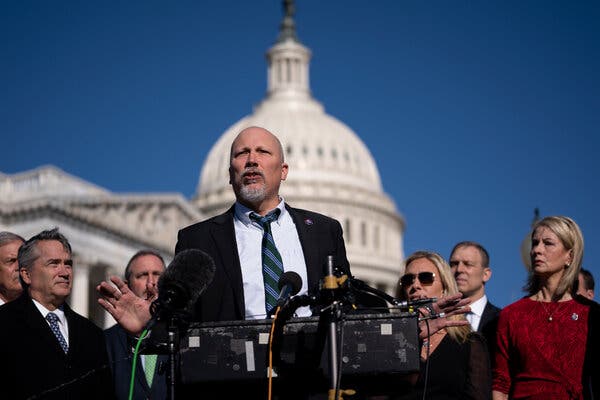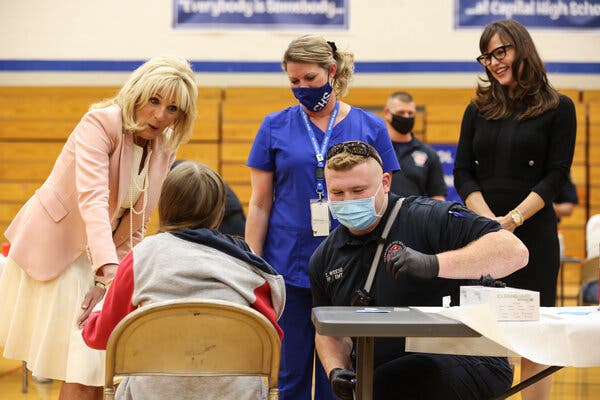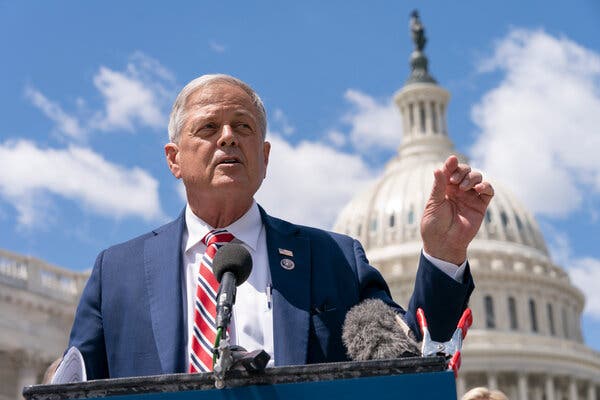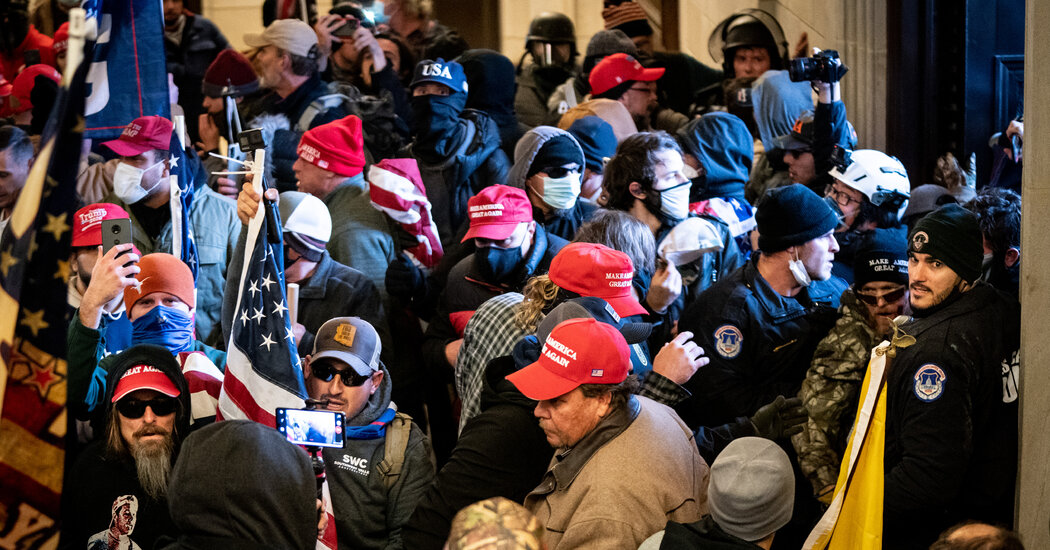Biden Says Colonial Pipeline Is Nearing Full Capacity After Hack
transcript
transcript
Biden Warns Against Panic Following Pipeline Cyberattack
President Biden delivered remarks following the Colonial Pipeline cyberattack and urged Americans not to panic over gas availability. The president also warned gas stations against taking advantage of the current gas shortage.
-
As part of an effort to use every possible means to accelerate fuel deliveries, last night I granted a waiver of the Jones Act to fuel suppliers. This allows non-U.S. flagged vessels to transport refined fuel products from the Gulf of Mexico to affected areas. And we’ll grant additional waivers if necessary. These steps are temporary, but they remain in place until full service is fully restored. This is as a whole of government response to get more fuel, more quickly to where it’s needed and to limit the pain being felt by American customers. I know seeing lines at the pumps or gas stations with no gas can be extremely stressful. But this is a temporary situation. Do not get more gas than you need in the next few days. As I said, we expect the situation to begin to improve by the weekend and into early next week. And gasoline supplies coming back online, and panic buying will only slow the process. And I also want to say something to the gas stations: Do not, I repeat, do not try to take advantage of consumers during this time. I’m going to work with governors of the affected states to put a stop to price gouging wherever it arises.

President Biden on Thursday welcomed news that gas has begun flowing through a critical pipeline that was shut down by the company after a ransomware attack by hackers, but he said that it would take time to resolve gas shortages along the East Coast and he warned stations not to engage in price gouging.
“They should be reaching full operational capacity as we speak, as I speak to you right now,” Mr. Biden said in remarks from the Roosevelt Room. “That is good news. But we want to be clear, we will not feel the effects at the pump immediately. This is not like flicking on a light switch.”
Colonial Pipeline paid extortionists roughly 75 Bitcoin — or nearly $5 million — to recover its stolen data, according to people briefed on the transaction, clearing the way for gas to begin flowing again but complicating the Biden administration’s efforts to deter future attacks.
Colonial Pipeline made the ransom payment to the hacking group DarkSide after the cybercriminals last week held up the company’s business networks with ransomware, a form of malware that encrypts data until the victim pays, and threatened to release it online. DarkSide is believed to operate from Eastern Europe, possibly Russia.
The company pre-emptively shut down its pipeline, which delivers nearly half of the transport fuels for the Atlantic Coast, setting off a cascading crisis that forced some airlines to make fuel stops on long-haul flights and led to emergency meetings at the White House, a jump in gas prices and panic buying at gas pumps.
Mr. Biden did not rule out the possibility that the administration would target the cybercriminals with a retaliatory strike, saying that the United States would pursue “a measure to disrupt their ability to operate.”
Jen Psaki, the White House press secretary, said the administration was waiting for recommendations from the United States Cyber Command.
Ms. Psaki said it remained the “position of the federal government” not to pay ransoms because the money can encourage criminals to conduct more attacks.
A company representative would neither confirm nor deny on Thursday that executives had paid a ransom. The payment was confirmed by people briefed on the matter, who declined to be identified because the information was confidential. It was earlier reported by Bloomberg on Thursday.

A former aide to Representative Doug Lamborn, Republican of Colorado, filed a lawsuit on Thursday claiming that he was fired after complaining about his boss’s disregard for safety measures meant to protect congressional staff members from the coronavirus, which he said resulted in an outbreak in Mr. Lamborn’s office.
The former aide, Brandon Pope, said in the lawsuit, filed in U.S. District Court in Washington, that he had tested positive for the virus on Nov. 19, one day after learning that Mr. Lamborn and two other staff members had contracted the virus.
Calling Mr. Lamborn the source of his own infection, either direct or indirect, Mr. Pope, 35, said his boss had misled his aides and the Office of the Attending Physician for Congress about his exposure. The lawsuit claims that Mr. Lamborn had slept in his Capitol Hill office and had close contact with infected staff members.
In the 16-page lawsuit filed against the office of Mr. Lamborn, Mr. Pope said that the representative had mostly barred aides in his district office in Colorado Springs from working remotely last year and made few accommodations to ensure social distancing or the wearing of masks.
When Mr. Pope told Mr. Lamborn and his chief of staff about his concerns, the lawsuit said, they dismissed them and eventually terminated him from his job as a defense and business adviser in December. From the start of the pandemic, Mr. Pope said, the message from Mr. Lamborn and Mr. Lamborn’s wife to the staff about the dangers of the virus had been clear.
“Both claimed that COVID was a hoax and asserted that the pandemic was being used to alter the course of the congressional and presidential elections,” the lawsuit said.
Cassandra Sebastian, a spokeswoman for Mr. Lamborn, 66, who was first elected to the House in 2006, denied the allegations in an emailed statement on Thursday.
“The workplace safety allegations made by Mr. Pope are unsubstantiated and did not result in the termination of his employment,” Ms. Sebastian said. “Congressman Lamborn looks forward to full vindication as all facts come to light.”
The lawsuit, which seeks unspecified damages, said Mr. Pope was hired to work as a Wounded Warrior Fellow in Mr. Lamborn’s district office in August 2019 after he retired from military service as a captain in the Marines who had served in Afghanistan. Mr. Pope was then hired last May to a full-time position as a defense and business adviser to Mr. Lamborn, according to the lawsuit. He worked in Washington in June and July of last year, the lawsuit said.

Representative Chip Roy of Texas, a strident conservative, will run against Representative Elise Stefanik of New York for the No. 3 House Republican leadership position, a move of protest reflecting unhappiness among hard-right lawmakers with the congresswoman party leaders anointed to replace Representative Liz Cheney.
Mr. Roy’s decision, reported earlier by Politico and confirmed by two officials familiar with the plans, comes as the Texas Republican, a former chief of staff to Senator Ted Cruz, also of Texas, had vented frustration about what he cast as Ms. Stefanik’s insufficient conservative credentials and party leaders’ rush to install her shortly after deposing Ms. Cheney for her unwillingness to stay quiet about former President Donald J. Trump’s election lies.
Republicans are scheduled to meet Friday morning to select Ms. Cheney’s replacement as chair of the House Republican Conference.
With Mr. Trump and House Republicans’ top two leaders backing Ms. Stefanik’s bid, it is unlikely that Mr. Roy’s candidacy could derail her ascension to the No. 3 post. But it is a sign of the internal discord in the conference prompted by the decision among party leaders to depose Ms. Cheney for her repeated efforts to call out Mr. Trump’s repeated myth of a stolen election.
Mr. Trump weighed in Thursday evening by reaffirming his support for Ms. Stefanik and writing that Mr. Roy “has not done a great job, and will probably be successfully primaried in his own district.”
Mr. Roy had circulated a remarkable three-page broadside on Tuesday scrutinizing the voting record of Ms. Stefanik — who was named one of the most bipartisan members of Congress before morphing into a strident Trump ally — and arguing that top Republicans were racing to elevate a lawmaker who he said did not reflect “our conservative values.”
“We must avoid putting in charge Republicans who campaign as Republicans but then vote for and advance the Democrats’ agenda once sworn in,” Mr. Roy wrote.
Mr. Roy voted to certify President Biden’s electoral win in January, and led a group of conservatives in the House who released a lengthy statement arguing against the effort and casting the challenge to the election as an attempt to “unconstitutionally insert Congress into the center of the presidential election process” that would amount to “stealing power from the people and the states.”

CHEYENNE, Wyo. — On a prairie hill on the rolling highway into Wyoming’s capital city looms a billboard with the beaming face of the state’s lone congressional representative, Liz Cheney. In huge letters it declares: “Thank you Rep. Cheney for defending the Constitution.”
Some local Republicans see Ms. Cheney’s lonesome stand against former President Donald J. Trump’s lies about a stolen election, and her refusal to back down, as an example of true Wyoming grit and independence.
But many others are quick to point out that the billboard was put up by an out-of-state dark money group, a sign of outsiders meddling. And among locals in this state that voted in a landslide for Mr. Trump, few are thankful for much of anything Ms. Cheney has done lately, and have vowed to vote her out of office.
“She broke our trust. I won’t vote for her again,” said James Crestwell as he sat on the front steps of his small Craftsman house in the central part of town on Wednesday.
Wyoming is rich in coal and other fossil fuels, and mining and drilling are major sources of jobs and tax revenue. President Trump championed those industries and loosened mineral leasing regulations. Under President Biden, who temporarily paused oil and mineral leases on federal land and has vowed to move the nation away from fossil fuels, the industry faces a more uncertain future. It’s hard for many locals to stomach criticism of a president who they say stood up for their values.
Mr. Crestwell, 50, who works at the local veterans’ hospital, voted for both Mr. Trump and Ms. Cheney, and said it was a mistake for her to criticize the former president. “Trump’s been good for us in Wyoming. Supported coal and oil,” he said. “She seems like she’s more for Washington than Wyoming — like she’s trying to impress her powerful friends there.”

CHARLESTON, W.Va. — Jill Biden, the first lady, landed in West Virginia just as the Centers for Disease Control and Prevention said on Thursday that vaccinated Americans could, for the most part, remove their masks. So, just before she disembarked from her plane, she did.
After weeks of murky guidance from the C.D.C. on what vaccinated Americans can and can’t do, the sight of a maskless first lady went far to clear up confusion — at least in Charleston, where she visited a vaccine clinic for children set up inside a local high school.
“We feel naked!” Dr. Biden said to a group of junior Army officers who had gathered to greet her. “I didn’t mean it that way.”
It was a surreal and memorable moment that underscored in a very public way just how strange these past million or so months have been. Back in Washington, officials in the Biden White House (quite literally) were able to breathe freely again as, one by one, masks began to come off.
At the White House, a maskless President Biden struck a more statesmanlike tone when he addressed the public in the Rose Garden.
“The Centers for Disease Control and Prevention and C.D.C. announced that they’re no longer recommending that fully vaccinated people need wear masks,” Mr. Biden said. “This recommendation holds true whether you are inside or outside. I think it’s a great milestone, a great day.”
At an earlier meeting on infrastructure, held in the Oval Office with a bipartisan group of senators, Mr. Biden — whose advisers were so strict about masks that they were known to police private meetings — stripped off his face covering, and so did the senators, Senator Shelley Moore Capito of West Virginia told reporters.
In the West Wing, officials, who have refrained from holding large in-person meetings together, began removing their masks as the administration issued new guidance for anyone on the complex: Anyone who had received their last required vaccine dose at least 14 days earlier could now go mask-free.
Elsewhere in the capital, other lawmakers celebrated the new guidance.
Senator Mitch McConnell, Republican of Kentucky and the minority leader, quoted the Rev. Dr. Martin Luther King Jr. to reporters as he addressed them without a mask for the first time in months: “Free at last.”
In the House of Representatives, the Capitol’s attending physician issued an updated guidance for lawmakers and their staff that said those who were fully vaccinated could “resume activities that you did prior to the pandemic” more or less as normal inside House office buildings. But the physician, Dr. Brian P. Monahan, said face coverings would still be required around the House floor.
“For the Hall of the House: The present mask requirement and other guidelines remain unchanged until all members and floor staff are fully vaccinated,” he wrote in a memo circulated to House offices.
On the road in Charleston, Dr. Biden, accompanied by Senator Joe Manchin III, Democrat of West Virginia, did their part to motivate the public.
“You’ve all seen the latest from the C.D.C.? That means no masks inside or outside,” Mr. Manchin said to a group of reporters.
“What does that mean for the people of West Virginia?” a reporter asked.
“It means get vaccinated!” Mr. Manchin said. “We feel free.”
It didn’t hurt their cause that the actress Jennifer Garner, who grew up in the state, appeared alongside them for the visit.

Gov. Ron DeSantis of Florida said on Wednesday that he would pardon “any Floridian” who violated mask or social distancing mandates.
Mr. DeSantis, a Republican, made the announcement during an appearance on the Fox News program “Ingraham Angle,” just a day before the Centers for Disease Control and Prevention shifted its guidelines to allow vaccinated people to skip wearing masks in most places.
The show’s host, Laura Ingraham, first interviewed Mike and Jillian Carnevale, the owners of a Broward County gym, who said they had been arrested for violating a county mask mandate. Mr. DeSantis then said their case was “a total overreach.”
Widely seen as positioning himself as a 2024 Republican presidential nominee, Mr. DeSantis throughout the pandemic has criticized coronavirus restrictions and mandates.
Mr. Carnevale said he and Ms. Carnevale were arrested three times after violating Broward County’s mask mandate. Mr. Carnevale was charged with two second-degree misdemeanors and if convicted would face a 120-day jail sentence, and Ms. Carnevale was charged with one second-degree misdemeanor, facing 60 days in jail, said Cory Strolla, a lawyer representing the couple.
Last month, Mr. DeSantis issued an executive order prohibiting businesses from requiring patrons or customers to show vaccination documentation, or risk losing grants or contracts funded by the state. Norwegian Cruise Line, which is requiring all guests and crew members to be vaccinated, said it was considering skipping Florida ports over the order.

A network of conservative activists, aided by a British former spy, mounted a campaign during the Trump administration to discredit perceived enemies of President Trump inside the government, according to documents and people involved in the operations.
The campaign included a planned sting operation against Mr. Trump’s national security adviser at the time, H.R. McMaster, and secret surveillance operations against F.B.I. employees.
The operations against the F.B.I., run by the conservative group Project Veritas, were conducted from a large home in the Georgetown section of Washington that rented for $10,000 per month. Female undercover operatives arranged dates with the F.B.I. employees with the aim of secretly recording them making disparaging comments about Mr. Trump.
The campaign shows the obsession that some of Mr. Trump’s allies had about a shadowy “deep state” trying to blunt his agenda — and the lengths that some were willing to go to try to purge the government of those believed to be disloyal to the president.

Missouri will not move forward on a voter-approved Medicaid expansion after the state’s Legislature decided not to fund the program.
The expansion was expected to cover more than 200,000 low-income residents. The rejection comes as the Biden administration is encouraging more states to join the program, with generous incentive payments included in the most recent stimulus package.
Missouri voters approved a ballot initiative last summer that would have the state join the Affordable Care Act’s Medicaid expansion. Voters passed the measure by almost seven percentage points, and July 2021 was to be the program’s start date.
But the state still needed to secure funding. States that expand Medicaid pay 10 percent of the costs, and the federal government picks up the rest.
Gov. Mike Parson of Missouri, a Republican, opposed the measure. But he still included money to fund the program in his January budget proposal. The Republican majorities in both the General Assembly and State Senate voted against that spending.
“Without a revenue source or funding authority from the General Assembly, we are unable to proceed with the expansion at this time,” Governor Parson said in a statement Thursday.
The decision is likely to face litigation from Medicaid expansion supporters, who contend that the state constitution requires the program to go forward this summer.
Six states have expanded Medicaid with ballot initiatives, a strategy by progressive groups to expand coverage in places where state governments are opposed. Signature-gathering efforts are now underway in South Dakota and Mississippi to get similar ballot initiatives in front of voters next year.
The ballot initiatives have a strong track record with voters, passing in all but one state (Montana) where they’ve been tried. But the method has drawbacks. After initiatives pass, governors often delay or alter the programs, or simply refuse to implement them. After seeing Medicaid ballots succeed elsewhere, some states have sought to change the ballot initiative process, with tougher requirements to get on the ballot.
Gov. Paul LePage of Maine said he “would go to jail” before expanding Medicaid. The program did not start enrolling members until the state elected a new governor, Janet Mills, a Democrat, in 2018.

The Biden administration on Thursday moved to repeal a Trump-era regulation that it said weakened the government’s ability to curb air pollution that threatens public health and is driving climate change.
Critics said the regulation distorted the costs of reducing air pollution while diminishing the associated benefits. It is one of several Trump administration policies that have been reversed by Michael S. Regan since he became the administrator of the Environmental Protection Agency in March.
Finalized at the end of the Trump administration, the so-called cost-benefit rule was designed to change how the E.P.A. calculated the economic costs and benefits of new clean-air and climate-change rules. Agency economists would have been required to calculate the public health benefits that stem directly from a new regulation and separately the value of ancillary benefits, or “co-benefits” — such as the reduction of pollutants not directly governed by the regulation. Direct benefits and “co-benefits” would have to be presented as separate categories.
Experts said that requirement appeared designed to give industries a way to legally block the E.P.A. over future air pollution rules. It would have also allowed the E.P.A. to avoid putting a price tag on certain health benefits if the scientific evidence was deemed limited.
“Revoking this unnecessary and misguided rule is proof positive of this administration’s commitment to science,” Mr. Regan said in a statement. He said his agency would “continue to fix the wrongs of the past.”
The policy had been long sought by the fossil fuel industry, which argued for years that the federal government used unfair economic formulas that resulted in burdensome pollution regulations.

A decrease in migrant children who arrived alone at the southern border last month gave Homeland Security Secretary Alejandro N. Mayorkas some ammunition to try to persuade senators on Thursday that the Biden administration is making progress containing a surge of migrants.
But April also set a record for the total number of migrants apprehended at the border, and Republicans on the Senate Homeland Security and Governmental Affairs Committee told the secretary that what they called a crisis has only gotten worse.
More than 178,000 migrants were caught last month trying to cross the American border with Mexico, a slight increase over the record-setting numbers seen in March, according to the latest data from Customs and Border Protection, a division of the Homeland Security Department. Most of the migrants were from Central America, fleeing violence, poverty and natural disasters.
Of those, more than 17,000 were migrant children who arrived alone, were apprehended by Border Patrol officers and then transferred to federal shelters where they wait as officials try to place them with family members or other sponsors living inside the United States. The number is down 9 percent from March.
The number of migrants who try to cross the southern border typically increases in the spring months. Both the Obama administration in 2014 and the Trump administration in 2019 saw unusually high numbers of children arriving at the border alone.
But this year has been worse, and the situation at the border has become a partisan flash point, with Republicans contending that migrants are taking advantage of weak Biden administration policies.
“The crisis today is unprecedented, far worse than it was last year, and even substantially worse than 2019, when everyone considered it a crisis,” said Senator Rob Portman of Ohio, the top Republican on the committee.
Mr. Mayorkas and other Biden officials have avoided describing the situation on the southern border as a crisis. And they point to recent successes of transferring the children out of the Border Patrol’s jail-like facilities and into large shelters overseen by the Health and Human Services Department. For example, on March 29, 5,767 migrant children were held in Border Patrol detention facilities for an average of 133 hours, nearly twice as long as what is legally allowed. At the same time, 11,886 children were in shelters run by Health and Human Services.
Those numbers have shifted after the government was able to bring on a network of emergency shelters. As of Wednesday, there were 536 migrant children in Border Patrol custody for an average of 24 hours. And 20,397 children were under the care of Health and Human Services, waiting in government custody to be placed, ideally, with a family member as their cases move slowly through the immigration court system. Many of the children who arrived at the border in 2019 are still in the country waiting to see an immigration judge.
For Republicans, the watchword is “crisis.”
“I see an extraordinary crisis,” Senator Mitt Romney, Republican of Utah, said on Thursday.
“I mean, do you recognize this as an alarming crisis?” he asked Mr. Mayorkas.
Mr. Mayorkas responded, “I look at immigration as a challenge that has been persistent for many, many years,” but was cut off by Mr. Romney who pointed to border data that was on display in the hearing room and said, “Is this not a massive failure?”

President Biden and his economic team on Thursday made their most detailed case yet for trillions of dollars in new federal spending to rebuild public investment in workers, research and physical infrastructure, focusing on long-term ingredients of economic growth and equality as the current recovery from recession showed signs of distress.
The president’s aides published what amounted to a deeper economic backbone for the argument that Mr. Biden is making publicly and privately to sell his plans to lawmakers, including the message he conveyed to a group of Republican senators he invited to the White House on Thursday to discuss an infrastructure package centered on roads, bridges, transit and broadband.
That meeting ended with encouraging words from both sides. Republicans said Mr. Biden invited the senators, who had previously offered a nearly $570 billion, narrowly focused package, to return with an updated offer, including how to pay for new spending.
Senator Shelley Moore Capito of West Virginia, who is leading the Republicans’ negotiations, said lawmakers would prepare an updated offer for the president to review by early next week, including a more detailed list of the kinds of projects they would be willing to fund and a set of proposals to cover the costs. The senators said they expected Mr. Biden would then respond with a counteroffer.
Ms. Capito said Republican senators were open to raising the overall top-line price tag of their offer, which is a fraction of the new spending the president proposed. She also suggested that Republicans would be willing to cut a deal with Mr. Biden even if he decided to pursue a more progressive package, including priorities beyond traditional infrastructure, with only Democratic votes.
Other senators predicted the sides would know by Memorial Day whether they could reach a deal.
Mr. Biden “stressed that inaction was a red line for him and that he wanted to see real progress toward a potential bipartisan deal by Memorial Day,” the White House said in a release to reporters.

As she arrived at the Capitol on Wednesday morning to meet her fate, the soon-to-be deposed No. 3 Republican in the House hinted that she was already eyeing her next role.
“The party is going to come back stronger, and I’m going to lead the effort to do it,” Representative Liz Cheney said as she stepped into an elevator and down to her demise.
Less than an hour later, accompanied by the acclaimed photographer David Hume Kennerly, a family friend, Ms. Cheney returned to her office for an interview with NBC’s Savannah Guthrie. A sit-down with Bret Baier of Fox News was to follow.
The message was unmistakable: Her colleagues may have stripped Ms. Cheney of her post as chair of the House Republican Conference, but they have effectively handed her a new platform and a new role as the leader of the small band of anti-Trump Republicans.
Representative Kevin McCarthy, the Republican minority leader, was trying to address a short-term challenge, and in a narrow sense he was successful. He will no longer have to contend with a member of his leadership team who, much to the consternation of him and his colleagues, continues to condemn former President Donald J. Trump’s attempt to overturn the election.
By excommunicating Ms. Cheney from her position, however, Republican lawmakers have created a host of new problems for their party.
They have underscored the grip that the increasingly unpopular Mr. Trump retains on their ranks; demoralized Republicans and independents who want to move on from his tenure; and, perhaps most significantly, emboldened a household-name conservative to take her case against Trumpism far beyond a Capitol conference room.
House Republicans knew what they had done as soon as they emerged from their meeting.
“That’s what it looks like when somebody is running for president,” Representative Mike Rogers of Alabama muttered to colleagues as they quickly walked past Ms. Cheney during her remarks in front of the cameras.
Other long-serving members, though, were more sobered by the divisions Mr. Trump is still sowing among Republicans and by the megaphone they had just handed Ms. Cheney.
“I don’t think it’s a healthy moment for the party,” said Representative Patrick McHenry of North Carolina, himself a former member of Republican leadership. “I do think it enhanced Liz’s stature and position in a way that furthers her message but to the disadvantage of the broader party.”
As Ms. Cheney discovered, Republican leaders will continue to bow to Mr. Trump as long as they’re worried that their rank-and-file voters will punish them for disloyalty.
This could prove ominous for Republicans in the most competitive districts and states: They may not be able to survive a primary without him, but they may prove unelectable if they’re linked too closely to him.
“There’s not a lot of good options,” said Brendan Buck, a former House Republican leadership aide.

A major in the Marine Corps was arrested on Thursday and accused of assaulting police officers during the riot at the Capitol, the first known active-duty service member to be charged in connection with the attack.
Prosecutors said that Maj. Christopher Warnagiris, who is stationed at a Marine base in Quantico, Va., violently entered the Capitol after pushing through a line of officers guarding the East Rotunda doors. Once inside, court papers say, Major Warnagiris, 40, used his body to prop the doors open and helped pull other rioters inside. When the Capitol Police attempted to close the doors, the papers said, Major Warnagiris shoved them in “an effort to maintain his position.”
Major Warnagiris was a veteran of the wars in Afghanistan and Iraq and a field artillery officer with almost 20 years of service, the Marine Corps said in a statement issued after his arrest. The Pentagon press secretary, John F. Kirby, declined to speak at length about whether the arrest would prompt any additional inquiries, saying only that the Pentagon wanted the Justice Department to take the lead.
“We need to let the legal process play out,” Mr. Kirby said. “It’s important that none of us get ahead of that and do anything that could prejudice the process.”
Major Warangiris had been stationed at Quantico since last summer, prosecutors said, and was brought to the attention of authorities after someone he had worked with in 2019 called the F.B.I. Investigators subsequently went to Quantico where another colleague identified him in wanted photos and from video footage taken during the riot, prosecutors said.
About 40 former members of the military, including at least one Special Forces operator, have been charged in connection with the Capitol attack. Last month, Pentagon officials announced a new initiative to weed out extremism among service members.
While officers from the other military services — the Army, Air Force, Navy and Coast Guard — have reported seeing former members in the pro-Trump crowd that stormed the Capitol, senior defense officials say the Corps was represented in far greater numbers.
Pentagon leaders have pored over videos from Jan. 6 that show the distinctive red flag of the Marine Corps waving on the National Mall and at the Capitol. In a statement, a spokeswoman said there was no place for “racial hatred or extremism” in the Marine Corps.
“Our strength is derived from the individual excellence of every Marine regardless of background. Bigotry and racial extremism run contrary to our core values,” said the spokeswoman, Maj. Melanie Salinas.
The Corps has long struggled with race; it has never in its 245-year history, for example, mustered a four-star officer who is not a white man. A number of Marines have also been investigated for alleged ties to white supremacist and extremist organizations. In 2018 a lance corporal was kicked out of the Corps after he participated in the violent “Unite the Right” rally in Charlottesville, Va., and bragged on social media about injuring people. A year later, another Marine lance corporal left after tweeting racist images and praising Nazis.
One former Marine charged in connection with the riot is Dominic Pezzola, an upstate New York man who is also a member of the far-right nationalist group the Proud Boys. Prosecutors say he smashed a window with a stolen police riot shield and was among the first people to storm the building and confront police inside.
Another former Marine, Michael Foy, of Michigan, has been charged with attacking police outside the Capitol with a hockey stick. Two more former members of the Corps, Alex Harkrider and Ryan Nichols, drove together from rural Texas to Washington and fought their way inside the building, prosecutors say, with a baton, a crow bar and pepper spray.
Prosecutors did not seek to detain Major Warnagiris before his trial, and he was released after a brief hearing in federal court in Virginia.

Four months after supporters of President Donald J. Trump stormed the Capitol in a deadly riot, a growing number of Republicans in Congress are mounting a wholesale effort to rewrite the history of what happened on Jan. 6, downplaying or outright denying the violence and deflecting efforts to investigate it.
Their denialism — which has intensified for weeks and was on vivid display this week at a pair of congressional hearings — is one reason that lawmakers have been unable to agree on forming an independent commission to scrutinize the assault on the Capitol. Republicans have insisted that any inquiry include an examination of violence by antifa, a loose collective of antifascist activists, and Black Lives Matter. It also reflects an embrace of misinformation that has become a hallmark of the Republican Party in the age of Mr. Trump.
“A denial of finding the truth is what we have to deal with,” Speaker Nancy Pelosi said on Wednesday. “We have to find the truth, and we are hoping to do so in the most bipartisan way possible.”
A House Oversight and Reform Committee hearing on the riot on Wednesday underlined the Republican strategy. Representative Andy Biggs of Arizona, the chairman of the right-wing House Freedom Caucus, used his time to show video of mob violence purportedly by antifa that had unfolded 2,800 miles away in Portland, Ore.
His fellow Freedom Caucus member, Representative Ralph Norman of South Carolina, used his turn to question whether rioters involved in the Capitol attack had actually been Trump supporters — despite their Trump shirts, hats and flags, “Make America Great Again” paraphernalia, and pro-Trump chants and social media posts.
“I don’t know who did the poll to say that they were Trump supporters,” Mr. Norman said.
Another Republican, Representative Andrew Clyde of Georgia, described the scene during the assault and its aftermath as appearing like a “normal tourist visit” to the Capitol. At least five people died in connection with the riot (not four police officers, as an earlier post said). Nearly 140 people were injured.
“Let’s be honest with the American people: It was not an insurrection,” Mr. Clyde said, adding that the House floor was never breached and that no firearms had been confiscated. “There was an undisciplined mob..”
Immediately after the attack, many Republicans joined Democrats in condemning the violent takeover of the building known as the citadel of American democracy. But in the weeks that followed, Mr. Trump, abetted by right-wing news outlets and a few members of Congress, pushed the fiction that it had been carried out by antifa and Black Lives Matter, a claim that the federal authorities have repeatedly debunked. Now, a much broader group of Republican lawmakers have settled on a more subtle effort to cloud and distort what happened.






